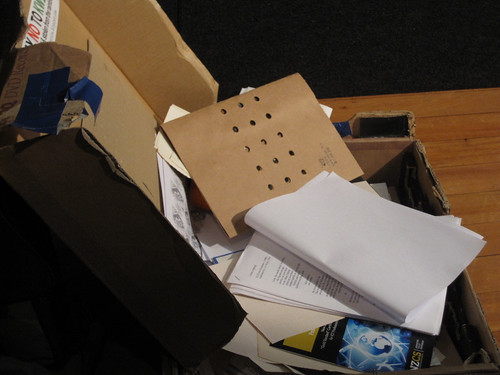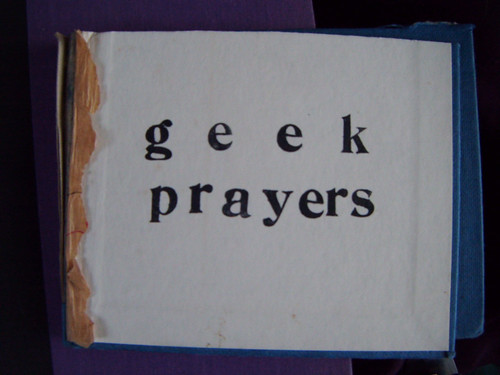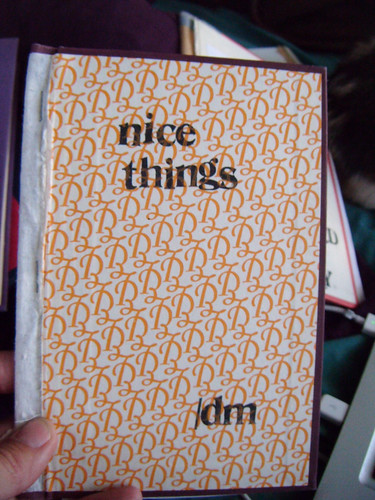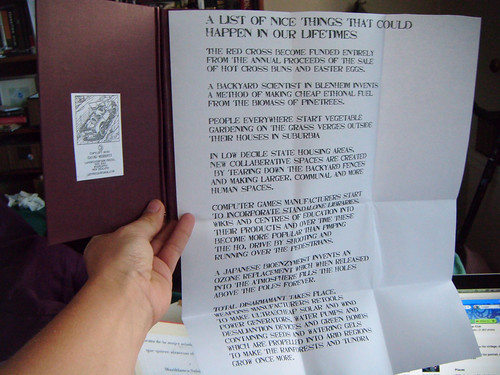I met David Merritt at linux.conf.au in Wellington, New Zealand earlier this year. He had a table in the exhibitor’s hall on Open Day and was making tiny books there with his son. He was carrying around Landrover Farm Press in his suitcase. His idea is that publishers should carry their means of production with them in a box. I got instantly very excited! I’ve been making xerox zines since 1986 and carried that forward over the years to many small press poetry books and journals as well as riot grrl zines.

David was taking the poems (previously printed or xeroxed), cutting them out at the table, stapling them into inside-out hardback book covers, pasting a label for his press on the inside cover, and then stamping the book titles on the front cover with alphabet block rubber stamps while chatting with his customers. Here is his “press in a box”:

Most people were buying a tiny book called “Geek Prayers”. I bought one for 5 bucks.

The poem itself made me think of Len Andersen’s “Beep“, a parody of Howl which I put up on the web a few years ago with his permission. Like Beep, it attempts to include computers, technology, and the experience and culture of the Internet into poetic experience, but unlike Beep it pushes into the territory of embodying that culture. All it needs is a web site where you can print and construct your own version…
As I looked over my hastily constructed Geek Prayers book, the cleverness of its design struck me.
This poem is structured in separate phrases rather like the giant sentence that’s the first section of Howl. The sections can be in any order, which is pretty handy for the book binding. The last part of poem is printed and cut out separately and glued to the back cover. You could print out the double-sided pages of poem snippets on a sheet of paper, then cut them across and fold them in any order. I thought this was a very clever way of avoiding fuss in the page-collating and binding process by using randomness. It is in itself an excellent geek solution for a geek poem!

Here is the outside cover unfolded, showing how the inside endpapers of the original cover look when dissected, stapled, and stamped. Frayed bits of mull, endpaper, and the spine’s cardboard backing stick out like torn lace. One cover is stamped with a library mark and “discarded” giving a pleasant retro feel to a book that now sports its new and more meaningful rubber stamp marks. The poem has a sort of wistful history in its covers, a ghost existence underlying its new incarnation as a book. We are ephemera!
Of course David and I got to talking about publishing and poetry. As we talked he just kept giving me more books and showing me more poems, which I read instantly and which made my head explode. Most poetry leaves me a bit bored, if not completely nauseated. I get VERY EXCITED when a poem is fabulous, weird, thoughtful, unexpected, out there, or has anything at all FREE in it. As in a song, there has to be a break. A disruption between order and disorganization that exposes something. I like the arcs of big ideas, and I like supercompressed symbolist narratives, and along with it all, disruption of language and something new.
I think we babbled for a couple of hours about being our own movement, the unnamed inheritors of the Beat, just writing a ton and scattering it out into the world without any constipated fretting about copyright and Being Important. I went on an extended rant about wankery poetry scenes, stuckup expensive journals that no one reads except to figure out how to get in them and that become instant landfill, my old projects to wheatpaste poetry all over Austin — OPUS or OccuPations of Uninhabited Space (after Takver’s mobiles in Ursula Le Guin’s anarchic epic, The Dispossessed). And while I like Book Arts people I cannot really get into the idea of a book as a precious one of a kind handmade object. I like better to churn out sloppy handmade books, mass-production style, that are affordable enough for anyone to buy and read them, or that are cheap and easy enough for me to produce that I don’t mind giving them away.
At some point I wheeled away to beg the use of the linux.conf.au organizers’ office printer, then was able to hand David a big batch of my own long ranting poems and a few translations. I talked about F.A. Nettelbeck and the tiny books he prints called “This Is Important” and how I look for the books printed by Alta in the 70s and early 80s and wrote letters with Cid Corman about bookmaking and short poems. If you haven’t seen Cid Corman’s tiny books, he did so much more than Origin (which rocks… but I love little handmade books.) We talked about short poems and long poems, form and performance and spoken word. It was really nice and unexpected to have this conversation at a technical conference!!
Here is David’s “first friday in fifteen”, which is one big 11 x 17 sheet trimmed down the long side to fit inside the cover, and folded up from the bottom so that the entire very long poem is on one page.

And here is a copy of his poem “nice things”, to show how interesting endpapers can jazz up an inside-out book:

The poem “nice things” is totally fucking awesome!

I’ll write another post about my explorations of making inside-out books over the past few months, inspired by David Merritt’s books from Landrover Farm Press, along with a step by step guide on how to do some recycled bookbinding!








